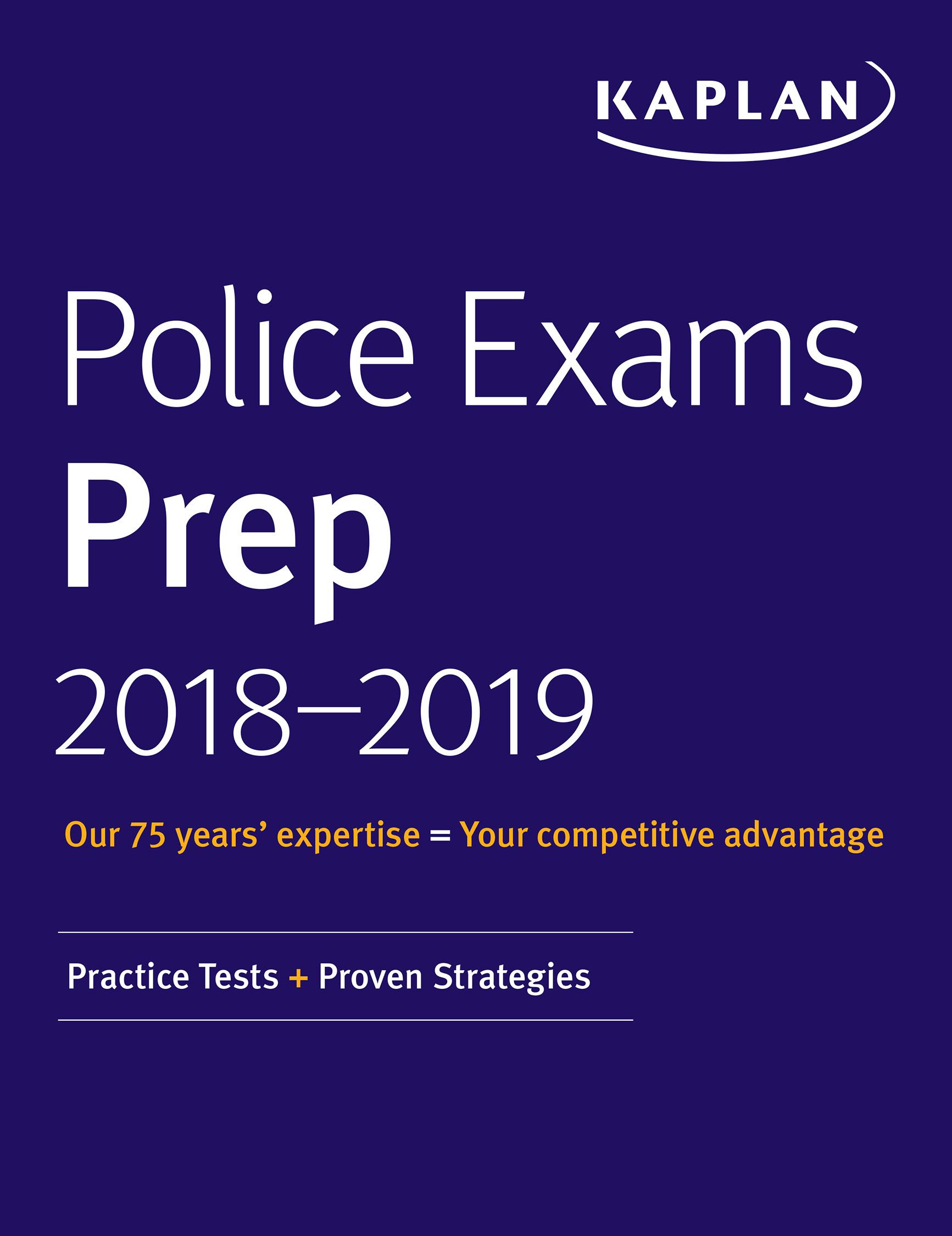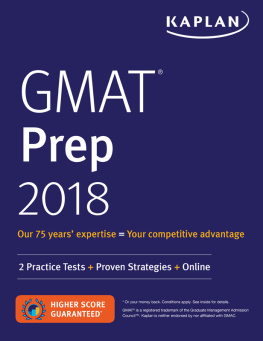
Police Exams
Prep
2018-2019
This publication is designed to provide accurate information in regard to the subject matter covered as of its publication date, with the understanding that knowledge and best practice constantly evolve. The publisher is not engaged in rendering medical, legal, accounting, or other professional service. If medical or legal advice or other expert assistance is required, the services of a competent professional should be sought. This publication is not intended for use in clinical practice or the delivery of medical care. To the fullest extent of the law, neither the Publisher nor the Editors assume any liability for any injury and/or damage to persons or property arising out of or related to any use of the material contained in this book.
This publication is designed to provide accurate and authoritative information in regard to the subject matter covered. It is sold with the understanding that the publisher is not engaged in rendering legal, accounting, or other professional service. If legal advice or other expert assistance is required, the services of a competent professional should be sought.
2018 Kaplan, Inc.
Published by Kaplan Publishing
750 Third Avenue
New York, NY 10017
ISBN: 978-1-5062-3420-5
10987654321
All rights reserved under International and Pan-American Copyright Conventions. By payment of the required fees, you have been granted the non-exclusive, non-transferable right to access and read the text of this eBook on screen. No part of this text may be reproduced, transmitted, downloaded, decompiled, reverse engineered, or stored in or introduced into any information storage and retrieval system, in any form or by any means, whether electronic or mechanical, now known or hereinafter invented, without the express written permission of the publisher.
Part 1
INTRODUCTION
Chapter 1
Police Careers
Introduction
Congratulations! You have taken the first steps toward securing a career in law enforcement. By purchasing this book, you have demonstrated a commitment to stand alongside thousands of others who have entered this challenging and rewarding field. By choosing Kaplan's Police Prep Plus, you have guaranteed yourself tough, effective preparation that will guide you to success on your exam.
A career in law enforcement has become more complex in recent years as new and varied threats to the safety of our communities arise. However, the core of police work remains the same. Police agencies are always looking for men and women who can effectively serve their fellow citizens. Service to ones community is an honorable callingthe term public servant is interchangeable with police officer. In the past, customer service was not always stressed as much as it is today. Now, agencies are increasingly looking for those who can communicate effectively and provide their clients with exceptional service.
Read on to find out more about the exciting and ever-changing career that awaits you!
Hierarchy of Duties
First, let's go into the levels of responsibility a typical police officer faces on the job. No matter what state or county you reside in, the following will apply to you and your team.
First: Help anyone in danger
When it comes to policing, the first priority is to protect the lives of citizens. As a police officer, always keep at the forefront of your mind that your primary duty is to protect lifeno matter who you are helping and what situation you encounter. All officers have an obligation and must swear to protect the lives of victims, bystanders, suspects, and offendersand of course their own lives as well as the lives of fellow officers.
Second: Secure public order
Police officers are also responsible for preserving the peace and maintaining public order on a daily basis. Officers must also maintain the peace during special events such as parades, sports, political events, and other community functions. When a law enforcement team secures public order and preserves the peace, demonstrations and rallies then remain orderly and lawful and a sense of safety and security is maintained. If a riot threatens, officers need to do everything they can to defuse the situation. Any acts of aggression or destruction must be stopped, without inciting further action.
Third: Uphold the law
To uphold the law and prevent crime is of course a main function for police officers. Understanding the law and how to apply it to difficult situations may not always be easy. At any given time, an officer must be trained in how to assess the situation, determining what laws may apply. Protecting crime scenes is also a crucial part of upholding the law: officers must know how to preserve evidence in order to assist in the investigation that will lead to an arrest, prosecution, and conviction of a guilty party. However, the crime scene should only be protected once it is deemed safe and clear by the officers at the scene.
Fourth: Customer servicehelp those needing assistance
A healthy percentage of a police officers calls may be service related. These types of calls are usually not crime related, and the public is looking for the officer to help them in whatever situation arises. These calls could range from medical assistance, traffic accidents with or without injuries, a lost child, mediation between neighbors, and even directions to tourists. You will also be required to respond appropriately to people who cant adequately care for themselves and require your help. These can include the elderly, children, the mentally or physically disabled, the homeless, and others in similar situations.
Social service calls play a huge role in law enforcement, and the responding police officer must be prepared to serve as the "face" of the department.
Fifth: Tend to your beat or patrol area
As any police officer will tell you, the job isnt as well plotted as a TV series. In real life, you dont get a weekly jolt of heart-stopping drama. Most of your job consists of keeping an eye on your little piece of the world. This is especially true now, as community policing becomes more and more widespread. The beat or patrol officer should act as a liaison between the community and the department. Enforcing quality of life (QOL) issues not only helps build trust between the officer and the community, but can also help reduce or prevent criminal behavior.
Getting to know the people within an officer's community is crucial. This will help the flow and exchange of information that is needed for the officer to properly do his or her job. The officer can quickly learn what normal looks like, and can spot anything thats out of place. Is there anyone around who looks like he or she doesnt belong? A light on in a store at a time when the owners not usually there? If you want to know about whats going on in the neighborhood, who do you go to?
Sixth: Maintain a Sense of Ethics
As a police officer, your day-to-day interactions with peoples of all races, nationalities, or diverse beliefs reflect not only on you, but your agency and all other police officers as well. Ethical issues arent easy to prioritize, but keep some of the basics in mind as you make decisions.
Remember your oath to serve.
You have made a commitment to perform certain duties; you are expected to respond, as an officer of the law, in any situation that requires law enforcement assistance. Police officers work under the motto To Serve and Protect, and this concept of helping and serving the public should not be taken lightly and should never be lost in your moral compass as a police officer.
Next page




